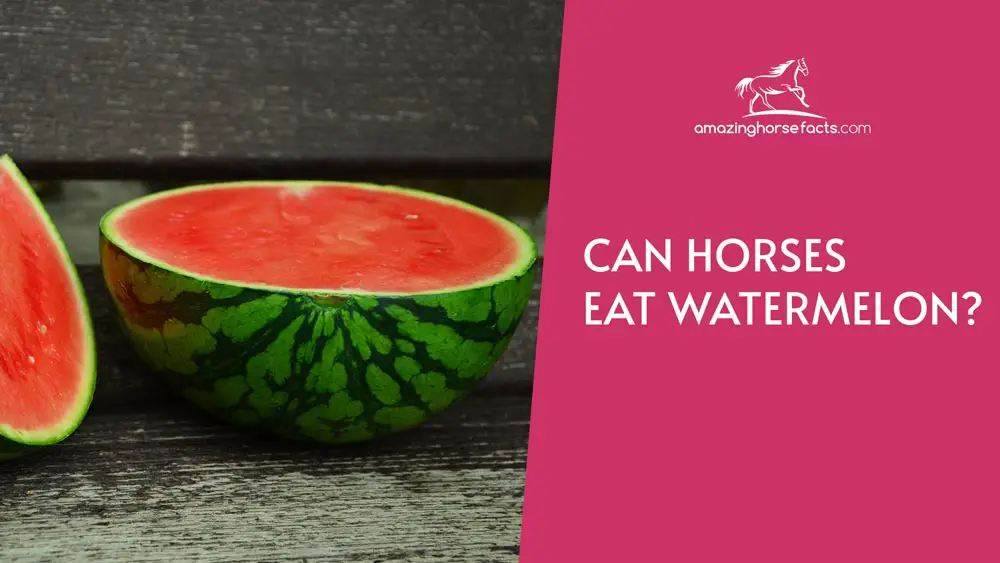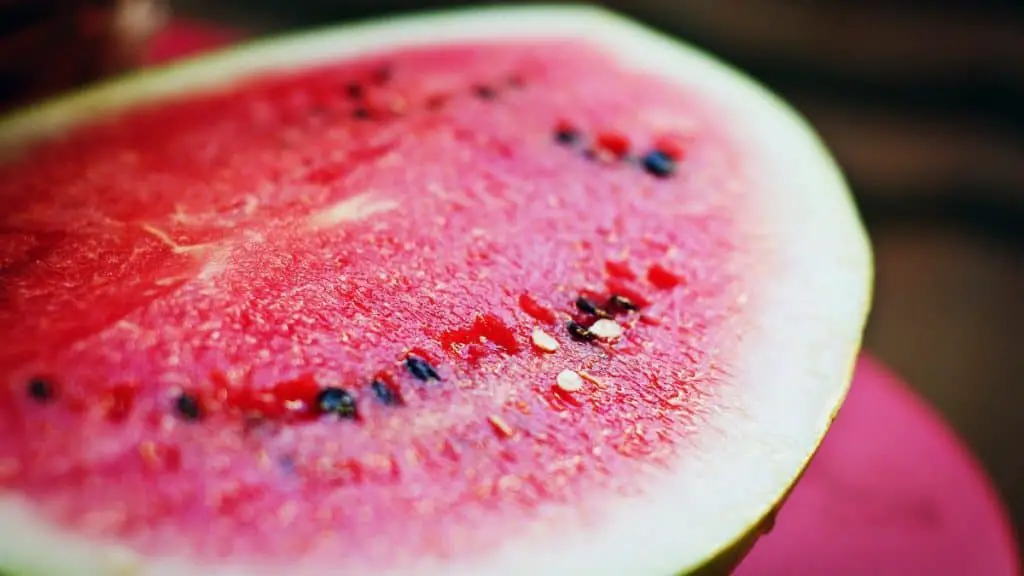Skip To Section

Yes, Horses can eat watermelon! There is no reason why a horse in good health can’t enjoy watermelon in the heat of summer or any time of year.
The refreshing taste of watermelon is something special, especially when the mercury rises. It’s cooling and tasty, and the good news is, you can share with your horse without any reservations. And horses love watermelon!
Just How Healthy Are Watermelons For Horses?
Watermelons are exceptionally healthy for horses to eat. They are also an excellent source of vitamins and a great source of liquid that is beneficial during hot months. Watermelon is also fat-free, low in sodium, and has no cholesterol.
Here is a list of all the vitamins included when you feed your horse watermelon.
- Vitamin B6- B6 is excellent for turning fats and carbohydrates into the energy your horse’s body needs.
- Vitamin A- A is very important for the health of your horse’s eyes, as well as bone strength and immunity.
- Vitamin C- C is another excellent immunity booster, along with aiding in cell repair.
- Iron- Iron aids in digestion and is also great for your horse’s immune system.
- Calcium- Calcium is beneficial for the strength of your horse’s bones, teeth, and hooves. It is also excellent for a horse’s heart.
- Potassium- Potassium is another beneficial vitamin for the heart health of a horse.
- Magnesium- Magnesium aids in keeping your horse’s sugars where they need to be, along with playing an important role in anti-inflammation.
- Phosphorus- Phosphorus is also used to aid in the strength of your horse’s teeth, as well as her kidneys.
- Fiber- Fiber is extremely important to a horse’s digestion
- Amino Acids- Amino Acids relax blood vessels and increase blood circulation. They are also great for lowering blood pressure, beating tiredness, and supporting vascular health.
Can Horses Eat Watermelon Rinds?
Like the fleshy pink part of the watermelon, the rinds are also loaded with nutrients. Fiber is especially high in watermelon rinds, along with potassium and citrulline.
The rind, however, needs to be prepared correctly. The rind should always be washed and scrubbed because it can be covered in unhealthy pesticides. Many of these contain harmful bacteria such as E. Coli, which can wreak havoc on your horse’s digestion.
Isn’t Watermelon Loaded With Sugar?
Not as much as you may think!
Watermelon may be awfully sweet, but luckily only a small percentage of this fruit is sugar. Especially in contrast to carrots ( which horses love )! Even the grass they eat contains much more sugar than watermelon. Keep this in mind when your horse is going to eat watermelon.
What About The Seeds?
Unlike apple seeds, watermelon seeds don’t contain cyanide. But even if they did, there is such a trace amount that it wouldn’t do any harm as long as it’s not overfed.
It’s important to know that you should never feed your horse the seeds only. Thankfully, the taste of watermelon seeds isn’t terribly pleasant, so you can safely assume that your horse won’t like them anyway.
And you can certainly purchase seedless watermelon if you still have concerns.

How Much Can My Horse Eat?
With any food in a horse’s diet, the keyword here is moderation. This goes for us humans, too! An overabundance of watermelon can give your horse’s digestive system some problems. You also need to be very careful of colic in these animals.
Be wary also that your horse can easily feel full because of the high water content of watermelon. This could cause him to take little interest in his dinner, resulting in a nutritional deficiency if it continues over time.
Watermelons may not have a terribly high amount of sugar, but this doesn’t mean they should be given large quantities of it. The amount of sugar can still cause dental problems or possibly increase your horse’s energy levels. This can be dangerous if your horse has no way to burn off this excess of energy.
How Should I Prepare It?
No matter how you are going to feed watermelon, aside from thoroughly washing the rind, be sure to cut the watermelon into small quantities. Horses can choke!
You can try popping it in the freezer and giving little watermelon cubes if it’s particularly hot. If frozen is too cold, then simply right out of the refrigerator can be just as refreshing.
As a great boredom buster, you can freeze quantities of water with watermelon in it. That way, he can eat the fruit as it melts.
Feel free to mix some chunks of watermelon with your horse’s regular food. It can certainly make the meal more interesting for him. Mixing watermelon with oats or coconut oil can be a delicious surprise that your horse is sure to enjoy.
Is It Safe For All Horses?
For most horses, watermelon is a safe and healthy treat in small amounts. But this is assuming that your horse is in excellent health. But horse owners should beware of some dental and dietary problems that can occur.
Older horses especially can have problems with their teeth. This can cause difficulty when chewing, and the watermelon rind specifically can cause problems.
Horses who suffer from Hyperkalemic Periodic Paralysis need to be very careful of their potassium levels, ensuring that it stays on the low side. Watermelons don’t have a large amount of potassium, but it’s better to be safe than sorry.
Watermelon should be avoided in any horse that suffers from any kind of insulin disorder. Several diseases affect a horse’s insulin level or production, and because watermelon does contain some sugar, it should be avoided in horses with this affliction.
As long as you follow these important tips, you can be assured that your horse will absolutely love you for sharing your watermelon with him.

